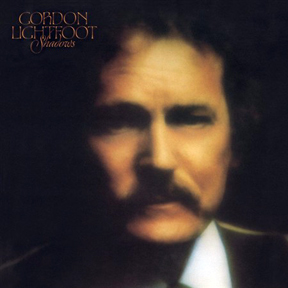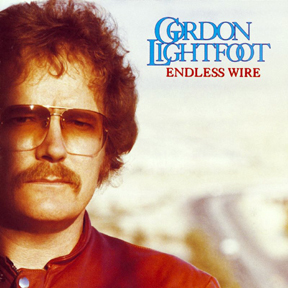
Gordon Meredith Lightfoot Jr. was a Canadian singer-songwriter and guitarist who achieved international success in folk, folk-rock, and country music. He is credited with helping to define the folk-pop sound of the 1960s and 1970s. He has been referred to as Canada's greatest songwriter, having several gold and multi-platinum albums and songs covered by some of the world's most renowned musical artists. Lightfoot's biographer Nicholas Jennings said, "His name is synonymous with timeless songs about trains and shipwrecks, rivers and highways, lovers and loneliness."

"The Wreck of the Edmund Fitzgerald" is a 1976 hit song written, composed and performed by the Canadian singer-songwriter Gordon Lightfoot to memorialize the sinking of the bulk carrier SS Edmund Fitzgerald in Lake Superior on November 10, 1975. Lightfoot considered this song to be his finest work.

"Me and Bobby McGee" is a song written by American singer-songwriter Kris Kristofferson and originally performed by Roger Miller. Fred Foster shares the writing credit, as Kristofferson wrote the song based on a suggestion from Foster. A posthumously released version by Janis Joplin topped the U.S. singles chart in 1971, making the song the second posthumously released No. 1 single in U.S. chart history after "(Sittin' On) The Dock of the Bay" by Otis Redding. Gordon Lightfoot released a version that reached number 1 on the Canadian country charts in 1970. Jerry Lee Lewis released a version that was number 1 on the country charts in December 1971/January 1972 as the "B" side of "Would You Take Another Chance On Me." Billboard ranked Joplin's version as the No. 11 song for 1971.

Sit Down Young Stranger is Canadian singer Gordon Lightfoot's sixth original album and his best-selling original album. Shortly after its 1970 release on the Reprise Records label, it was renamed If You Could Read My Mind when the song of that title reached #1 on the RPM Top Singles chart in Canada and #5 on the Billboard Hot 100 in the US. The album itself reached #12 on the Billboard 200 chart. In Canada, the album was on the charts from April 18, 1970, to November 27, 1971. It peaked at #8 on March 13, 1971 after an earlier peak at #12 on June 20, 1970. Its last 24 weeks were spent in the 90s, except for two appearances at #88 and one at #100.

Summer Side of Life is Canadian singer-songwriter Gordon Lightfoot's sixth studio album. It was released in 1971 on the Reprise Records Label. The album marked a departure from the sound Lightfoot had established on Sit Down Young Stranger in its use of drums and electric instrumentation, to which he would later return in the second half of the decade. “Redwood Hill” contains elements of bluegrass music.

Don Quixote is Canadian singer Gordon Lightfoot's seventh studio album, released in 1972 on the Reprise Records Label. The album reached #42 on the Billboard album chart.

Shadows is Canadian singer Gordon Lightfoot's fourteenth studio album, released in 1982 on the Warner Bros. Records label. It peaked at #87 on the Billboard charts.

Endless Wire is the Canadian singer Gordon Lightfoot's twelfth studio album, released in 1978 on Warner Bros. Records (#3149).

Summertime Dream is Canadian singer Gordon Lightfoot's eleventh studio album, released on the Reprise Records label in 1976. It peaked at #1 on the Canadian RPM national album chart, and #12 on the US Billboard pop chart.

Salute is the fifteenth studio album by Canadian musician Gordon Lightfoot, released in 1983 Warner Brothers Records. It barely registered on the charts (#175) and is one of his least-known recordings. Consequently, songs from the album were rarely featured in Lightfoot's live performances.

Cold on the Shoulder is Canadian singer Gordon Lightfoot's tenth studio album, released in 1975 on the Reprise Records label.

East of Midnight is Canadian musician Gordon Lightfoot's sixteenth studio album, released in 1986 on the Warner Bros. Records label. The album reached #165 on the Billboard 200.

To Whom It May Concern is the tenth album by the Bee Gees. Released in October 1972, it is the follow-up to, and continues the melancholic and personal sound of its predecessor, Trafalgar. The album was recognised as "a farewell to the old Bee Gees" as the album marked the end of an era for the group in several ways: it was their last album to be recorded solely at IBC Studios, in London, their last with conductor and arranger Bill Shepherd, who had guided them since 1967, and their last under their first contract with Robert Stigwood. Some of the songs were old ones finished or rewritten for the occasion.

Gord's Gold Volume II is a compilation album released by Canadian singer Gordon Lightfoot in 1988.

"Sundown" is a song by Canadian folk artist Gordon Lightfoot, from the titular album, released as a single in March 1974.

Leavin' Town is the second studio album by American country music artist Waylon Jennings, released in 1966 via RCA Victor. It peaked at #3 on the Billboard country albums chart.

Patsy Cline's Greatest Hits is a compilation consisting of American country pop music singer, Patsy Cline's greatest hits. The album consists of Cline's biggest hits between 1957 and 1963. It is one of the biggest-selling albums in the United States by any female country music artist.

Songbook is a career retrospective album released by Canadian singer Gordon Lightfoot on the Rhino label in 1999. The album contains 88 songs on four CDs covering Lightfoot's career, and includes 16 previously unreleased tracks. The only material not covered are the albums Harmony and Solo, which were released after Songbook.

The discography of Canadian folk and country music singer-songwriter Gordon Lightfoot consists of 20 studio albums, three live albums, 16 greatest hits albums and 46 singles. Lightfoot's songs, including "For Lovin' Me", "Early Morning Rain", "Steel Rail Blues", "Ribbon of Darkness"—a number one hit on the U.S. country chart with Marty Robbins's cover in 1965—and "Black Day in July" about the 1967 Detroit riot, brought him wide recognition in the 1960s. Canadian chart success with his own recordings began in 1962 with the No. 3 hit "(Remember Me) I'm the One", followed by recognition and charting abroad in the 1970s.
"Ribbon of Darkness" is a song written by Gordon Lightfoot that was released in 1965 as a single by Marty Robbins. The song was Robbins' eleventh number one on the U.S. country singles chart, where it spent one week at the top and a total of nineteen weeks on the chart.


















